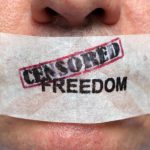Track censored content on Facebook, Twitter, Google and other social media

There are many problems with the censoring of online content, not least that it can limit free speech. But there is also the question of transparency. By the very nature of censorship, unless you have been kept in the loop you would simply not know that anything had been censored.
This is something the Electronic Frontier Foundation wants to change, and today the digital rights organization launches Onlinecensorship.org to blow the lid off online censorship. The site, run by EFF and Visualizing Impact, aims to reveal the content that is censored on Facebook, Google+, Twitter, Instagram, Flickr, and YouTube -- not just the 'what' but the 'why'. If you find yourself the subject of censorship, the site also explains how to lodge an appeal.
Following criticism, Facebook introduces changes to 'real names' policy

Unlike many other social networks, Facebook has long required its users to display their real names. Over the last couple of years there have been many vocal complaints from various types of user who feel victimized by this: drag queens, transgender and LGBT communities, and Native American users, for instance.
As well as users directly affected by the policy, privacy groups such as the Electronic Frontier Foundation have campaigned for Facebook to have a rethink. And it seems that the social network has listened. Facebook's Alex Schultz has written an open letter which, while not announcing the end of the real names policy, introduces a couple of key changes that will please many people.
EFF tells California Supreme Court no searches of controlled substance prescriptions

The Electronic Frontier Foundation has been busy lately, especially with all of the revelations coming from Edward Snowden. The organization has been busy taking on the NSA, but that doesn't mean it won't have time for other causes.
Now the EFF is taking on the California Supreme Court, urging an end to the gathering of personal prescription information by law enforcement and done without a warrant.
US government will not force companies to decode encrypted data... for now

The Obama administration has announced that it will not require companies to decrypt encrypted messages for law enforcement agencies. This is being heralded as a 'partial victory' by the Electronic Frontier Foundation; partial because, as reported by the Washington Post, the government "will not -- for now — call for [such] legislation".
This means that at the moment companies will not be forced to build backdoors into their products, but there is no guarantee that this won’t happen further down the line. The government wants to continue talks with the technology industry to find a solution, but leaving things in limbo for the time being will create a sense of unease on both sides of the debate.
EFF joins Nameless Coalition and demands that Facebook kills its real names policy

Facebook has come under heavy criticism for its real names (or 'authentic identities' as they are known to the social network) policy. Over the last year, all manner of rights groups and advocates have tried to convince Facebook to allow users to drop their real name in favor of a pseudonym if they want.
Now the Electronic Frontier Foundation is part of the 74-member strong Nameless Coalition and has written to Facebook demanding a rethink on the ground of safety, privacy, and equality. This is far from being the first time Facebook has been called on to allow the use of 'fake names', and the latest letter is signed by LGBT groups, freedom advocates, privacy supporters, and feminist organizations.
The man who cared about your online privacy has died

Caspar Bowden, the privacy advocate who was warning about the activities of the NSA before Edward Snowden, has died. The co-founder of the Foundation for Information Policy Research lost his battle with cancer, and tributes have been paid by the world of technology.
Bowden, the former head of privacy at Microsoft, had long-warned about potential backdoors in software and services. He campaigned passionately for the privacy of the individual and voiced grave concerns about the NSA and the FISA Amendment Act. He sat on the board of Tor and was one of the most knowledgeable and well-loved figures on the privacy scene.
What is Facebook not telling us about machiavellian censorship?

Just a few days ago the Electronic Frontier Foundation published its annual Who Has Your Back report looking at how various technology companies treated customer privacy. The report makes for interesting reading, but it also raises some questions. One question that has cropped up several times is "how the hell did Facebook get a rating of 4 out of 5!?"
As well as rating Mark Zuckerberg's social network in terms of its privacy policies and how it responds to government data request, the EFF also probes the hidden censorship that appears to be going on. There have been numerous examples of blatant censorship from Facebook -- including blocking certain pages in Turkey -- and while this is worrying (particularly when the social network's founder is looking to connect the world to the web with Internet.org) what is perhaps more concerning is the censorship we don't know about. The silent censorship that's going on the in the background.
Recent Headlines
Most Commented Stories
BetaNews, your source for breaking tech news, reviews, and in-depth reporting since 1998.
Regional iGaming Content
© 1998-2025 BetaNews, Inc. All Rights Reserved. About Us - Privacy Policy - Cookie Policy - Sitemap.